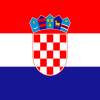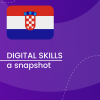5 Steps for a Strong, Sustainable and Competitive Croatian ICT Industry of the Future

The HUP – ICT Association defined the Position paper to map the biggest challenges currently faced by the Croatian information and communication (ICT) industry, which prevent it from achieving its full potential. The idea of this document is to provide clear, concise and above all measurable proposals and recommendations, necessary for the continued strong growth of one of the flagships of the Croatian economy. Position paper is considered in the short and medium term and is intended for all stakeholders in the political process and the industry as a whole.
The document first looks at the positive developments at the domestic level that have helped the ICT industry in its growth so far. After that, the challenges that plague the global community are listed, such as demography and climate change, which Croatia is not able to solve on its own. Finally, the main part of this document outlines 5 steps that Croatia must take today to have a stronger, more competitive and more resilient industry tomorrow. In some larger areas, HUP-ICT also proposes additional recommendations, which it then explains.
- Step 1 towards boosting the business environment in Croatia involves reducing the tax and parafiscal burden, with the aim of reducing the burden on the Croatian economy by at least 20% by the end of 2025 according to the National Recovery and Resilience Plan (NRRP). Lack of transparency regarding non-tax levies is a challenge, so it is proposed to introduce a publicly accessible online Register in which, by the practice we have witnessed in the past, all non-tax levies would be listed.
- Step 2 focuses on the lack of a highly skilled workforce in the ICT sector, and recommends adapting the education system to create additional STEM directions. The partnership between the private sector and educational institutions, as well as the promotion of the STEM area to girls during their education, are key elements of this step.
- Step 3 is to encourage research, development and innovation (R&D&I) through the establishment of an innovation sandbox. Innovation sandbox) to support primarily startups in testing ideas, especially those related to artificial intelligence.
- Step 4 aims to strengthen the partnership between industry and public administration, with a focus on fast, high-quality, and intuitive digitalisation of public administration. The implementation of the national interoperability framework, the training of public administration employees and the improvement of tenders for digitisation services are key elements of this step.
- Step 5 focuses on strengthening the network infrastructure for a successful digital transition in rural areas. Key measures include ensuring high-capacity, high-quality, widespread, affordable and secure infrastructure, improving the regulatory framework, legalising existing infrastructure, facilitating investment and encouraging the utilisation of very high network capacity through vouchers. It is also important to reduce costs and simplify spatial planning and construction procedures and ensure the necessary legal changes for the smooth construction of electronic communications networks.
The Croatian ICT industry has experienced noticeable growth and development in the past few years and is recognized throughout Europe and the world as an innovative, dynamic and valuable branch of the economy. The positive development of the Croatian ICT industry so far owes it to the long-term vision of companies, but also to a few key documents that have so far shaped this branch of the economy, as well as to those who are yet to do so. HUP-ICT here highlights documents such as the National Development Strategy of the Republic of Croatia until 2030, which emphasizes the need for smart specialization of the ICT sector for the transformation of the economy, while the Digital Croatia Strategy 2032 encourages technological development and sets goals for further cooperation. Nevertheless, despite the positive trends, the industry faces the challenges of demography, and a lack of talent and skills, while seeking a holistic approach, cooperation and dialogue between the sector, government and educational institutions.
As some of its first recommendations, HUP-ICT emphasizes the importance of the STEM field, emphasizing the necessity of its knowledge in performing everyday tasks that require the use of digital tools and artificial intelligence (AI). With the recommendation of strengthening STEM education and partnerships between the private sector and educational institutions, HUP-ICT particularly draws the attention of all relevant stakeholders to the importance of stronger attraction of young girls to the STEM field. In the short term, HUP-ICT proposes to provide additional funding from European funds for the launch of ICT studies in foreign languages, while medium-term measures include increasing enrolment quotas in gymnasium programs, modifying the vocational education system, and ensuring specialization through regional competence centers. The goal is to increase the number of ICT specialists and achieve an 8% share of ICT specialists in the workforce by 2032. One of the biggest problems is youth unemployment. One in five unemployed people for the Croatian industry means a huge loss and missed growth. In this context, HUP-ICT proposes measures such as further encouraging cooperation between the education system and the private sector, increasing incentives for professional practices and using EU funds to address the lack of a quality workforce.
Challenges and recommendations
One of the challenges facing the ICT industry in Croatia for a long time, as well as the wider economy, is the large number of parafiscal charges, so the recommendation is to revitalize the Register of Parafiscal Charges, which will monitor the number, life cycle, legal basis, taxpayers and the use of revenues of these parafiscal charges.
Looking to the future, if Croatia wants to continue building the ICT industry and enable it to grow and develop strongly, the only way forward is to invest in innovation and research and development. The establishment of a regulatory sandbox is also part of the upcoming EU regulations, providing additional hardware and software solutions primarily to young companies would enable them to enter the market more safely with their products.
As one of the last recommendations, HUP-ICT mentions faster and better digitization of public administration and its business. In addition, through the digitalisation of public procurement, faster and better data sharing with industry, and the continued digitalisation of society and the expansion of network infrastructure, Croatia can indeed be considered a digital society of the 21st century.
@freepik



